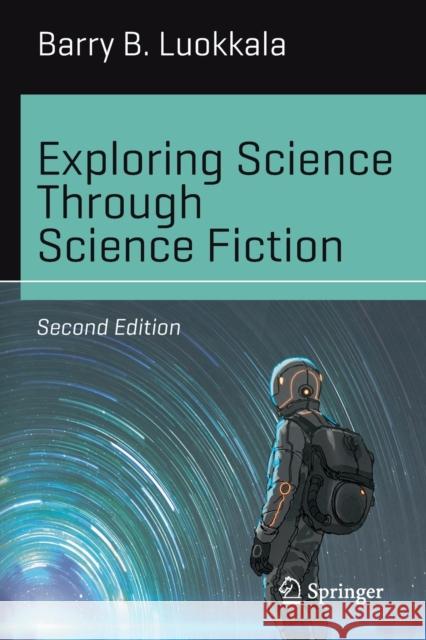Exploring Science Through Science Fiction » książka



Exploring Science Through Science Fiction
ISBN-13: 9783030293925 / Angielski / Miękka / 2019 / 335 str.
Exploring Science Through Science Fiction
ISBN-13: 9783030293925 / Angielski / Miękka / 2019 / 335 str.
(netto: 135,62 VAT: 5%)
Najniższa cena z 30 dni: 127,20
ok. 16-18 dni roboczych.
Darmowa dostawa!
Exploring Science Through Science Fiction addresses these and other intriguing questions, using science fiction as a springboard for discussing fundamental science concepts and cutting-edge science research.
"The history of science is present throughout the chapters, providing a backdrop for teaching science using the book. ... a very densely written book, filled with lots of information ... The major strength of the book is that it is not merely a collection of assignments for students to calculate, instead taking the reader on a trip through history and science fiction, subsequently asking thought- and discussion-provoking questions on a diverse set of science and extra-scientific issues ... ." (Laura Søvsø Thomasen, Metascience, December 2, 2021)
From the book reviews of the first edition:
"Barry B. Luokkala's Exploring Science Through Science Fiction offers a wide-ranging treatment of fundamental scientific questions and concepts as dramatized in science fiction. Designed for an undergraduate science course, this textbook addresses the varying degree of plausibility inherent to many popular science fiction constructs ... . Exploring Science through Science Fiction strikes a delicate compromise, introducing readers to the fantastical side of science without being completely overwhelming." (Jen Jenkins, Journal of Science Fiction, Vol. 2 (1), September, 2017)
"Exploring Science through Science Fiction fits into a lineage of works that use science fiction as a starting point for science education. ... The book is very clear and well written. ... the book is a good text for an optional one-semester undergraduate course, but it can also be used as a source of ideas for sci-fi illustrations of particular points in any core science course, even at high school level. ... I highly recommend this book." (Jerzy Brzozowski, Science and Education, Vol. 25, 2016)
"Luokkala has recognized the usefulness of this bridging of the arts and sciences in the classroom, and his textbook ... comes out of more than a decade of teaching an undergraduate course on this topic. ... it provides an engaging introduction to scientific thinking. The proposed discussion topics may indeed work best in a mixed classroom, in which students will be able to learn how views on the topic under discussion may differ between scientists and non-scientists." (Kanta Dihal, Foundation, Vol. 122, 2015)
"The author presents many good discussion and exploration topics, as well as back-of-the-envelope-type estimation problems. The references include DVD release and scene number information, making the chapter and end-of-book bibliographies highly valuable to instructors interested in bringing such subject material into their classroom. Summing Up: Recommended. All undergraduate students, faculty, and general readers." (S. A. Curtis, Choice, Vol. 51 (10), June, 2014)
"Exploring Science Through Science Fiction is organized into seven chapters centered on common themes in science fiction film and literature ... . this book is an engaging and readable text. ... The textbook has the ability to spark in its readers an interest in and appreciation for science and technology. Luokkala provides ample resources in the appendices for interested readers to continue their own investigations." (Emily Margolis, Quest The history of Spaceflight, Vol. 21 (3), 2014)
Barry Luokkala is a teaching professor and director of undergraduate laboratories in the department of physics at Carnegie Mellon University. He received his BS and MS degrees in physics at the University of Pittsburgh, where he did experimental research in the physics and chemistry of the ionosphere. He received his PhD in experimental condensed matter physics at Carnegie Mellon University. He has also served as program director for the Pennsylvania Governor’s School for the sciences and has been a science consultant for the Sloan Foundation Screenplay Competition in Carnegie Mellon’s School of Drama.
How does Einstein’s description of space and time compare with Doctor Who? Can James Bond really escape from an armor-plated railroad car by cutting through the floor with a laser concealed in a wristwatch? What would it take to create a fully intelligent android, such as Star Trek’s Commander Data?
Exploring Science Through Science Fiction addresses these and other intriguing questions, using science fiction as a springboard for discussing fundamental science concepts and cutting-edge science research. It includes references to original research papers, landmark scientific publications and technical documents, as well as a broad range of science literature at a more popular level.
The revised second edition includes expanded discussions on topics such as gravitational waves and black holes, machine learning and quantum computing, gene editing, and more. In all, the second edition now features over 220 references to specific scenes in more than 160 sci-fi movies and TV episodes, spanning over 100 years of cinematic history.
"This journey from science fiction to science fact provides an engaging and surprisingly approachable read..." (Jen Jenkins, Journal of Science Fiction, Vol. 2 (1), September 2017)
1997-2026 DolnySlask.com Agencja Internetowa
KrainaKsiazek.PL - Księgarnia Internetowa









